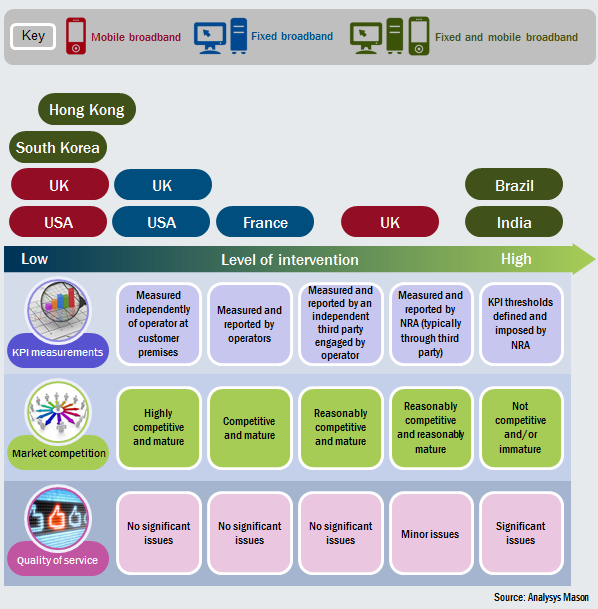National regulatory authorities can help to ensure quality of service for broadband customers
Consumers are becoming increasingly dependent on fixed and mobile broadband services, yet the quality of these services does not always meet their expectations. In particular, consumers who use video streaming services such as Netflix are increasingly aware of the detrimental effect that poor and inconsistent broadband quality has on their experience. If consumers experience poor-quality services, they need to determine the most effective way to resolve issues. In the first instance they can complain to their broadband service provider (BSP), but the BSP may not know how best to resolve the individual consumer's issue in the short term. Alternatively, consumers may contact the national regulatory authority (NRA), but they may not necessarily know how best to substantiate their complaint and secure an effective solution. It is a complex process to assure end-to-end broadband quality of service (QoS), and BSPs may have other, higher-level commercial priorities.
For these reasons, NRAs are beginning to take a proactive approach (some more directly than others) to consider how consumer expectations of broadband service quality might be met. In this article, we examine the difficulties that consumers face when seeking improved broadband services from BSPs and discuss the various ways that NRAs can help to protect consumers' interests.
There are a number of barriers preventing consumers from receiving improved broadband services
There are various factors which may prevent consumers from influencing BSPs to improve their services, such as:
- lack of individual bargaining power with BSPs
- lack of information and transparency regarding the characteristics of the services provided
- difficulty understanding technical terms and the broadband service performance limits
- difficulty understanding contract terms and conditions.
Consumers typically have the option of moving to a different BSP. However, there are switching barriers (such as long-term contracts), and even if consumers do change BSP, they cannot be certain that quality will improve. Therefore, NRAs are increasingly taking measures to help improve the quality of broadband services and ensure that consumer expectations are met (see Figure 1).
Different NRAs adopt different approaches for protecting consumers
NRAs have a number of complementary regulatory, monitoring and reporting tools at their disposal to support consumers, including:
- publishing BSP service performance and/or price comparisons
- publishing consumer satisfaction surveys, and comparing the quality of experience of all BSPs' services
- introducing a voluntary code of practice for BSPs to ensure that consumers receive appropriate service information to allow them to make objective purchasing decisions
- defining and enforcing regulation for broadband traffic management
- defining and enforcing a QoS framework – potentially with financial penalties for non-compliance.
NRAs adopt different approaches depending on individual market characteristics. Some approaches have a more direct influence on the market than others – that is, they are more interventionist (see Figure 1).
Figure 1: Scope of NRA intervention for a sample of countries

In markets where competition is limited – and where the QoS of existing services is unsatisfactory – NRAs tend to take a more direct approach, such as implementing a QoS regulatory framework. This includes the measurement of key performance indicators (KPIs) for broadband service – particularly service provisioning time, average speed and service availability time. The values for a standard, comparable set of KPIs for all broadband services available in the market are then published so that consumers can make an informed service choice.
In some cases, NRAs define KPI thresholds that must be met by a BSP's broadband service: if the thresholds are not met, the NRA penalises the BSP (financially or otherwise). For example, Anatel (the NRA in Brazil) adopted a financially punitive approach in 2011. Anatel defined KPI thresholds for both fixed and mobile BSPs – with associated financial penalties for non-compliance – because several BSPs continued to provide poor broadband service quality. Anatel has fined BSPs millions of US dollars since the broadband QoS regulation was introduced.
In marked contrast, NRAs tend to adopt a more hands-off approach in markets where competition is well developed, and instead rely on market forces to ensure that each BSP continually improves its services to remain competitive. For example, in the highly competitive market of Hong Kong, BSPs are required to simply publish performance pledges. These pledges do not represent service 'guarantees', but they do provide an indication of the expected level of broadband service quality.
NRAs need to understand individual market characteristics before introducing any QoS regulatory framework
As consumers become increasingly dependent on services that require high-quality broadband connections, they are demanding higher QoS, as well as greater speed. However, in some markets, some BSPs find it challenging to meet the continually burgeoning demand for high-quality, high-performance broadband services, which results in not meeting consumer expectations.
NRAs must decide whether there is a case for introducing a QoS regulatory framework in areas where market competition does not continually drive improvements in QoS. We believe that there may be justification for NRAs to introduce a QoS regulatory framework in some markets. However, NRAs must carefully consider the prevailing market characteristics when designing such a framework in order to produce the desired market effect. A well-designed QoS regulatory framework must ensure that consumers benefit from continual improvements in broadband services, while at the same time supporting the advantages of open market competition.
Analysys Mason advises NRAs and network operators on how to define, implement and measure network quality. Our advice helps our clients improve network quality – to the benefit of both the consumer and market competition.
Downloads
Article (PDF)Latest Publications
Project experience
Enhancing Microsoft’s product and marketing strategy and strengthening its position as a thought leader in the SMB segment
Project experience
Using segmentation and insights from digital-native businesses to inform a global networking vendor’s sales and marketing strategy in Asia–Pacific
Project experience
Transforming a global financial management software vendor’s go-to-market strategy through advanced customer segmentation

